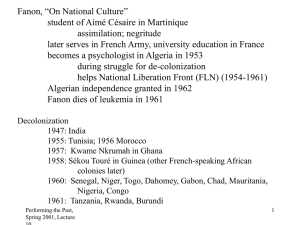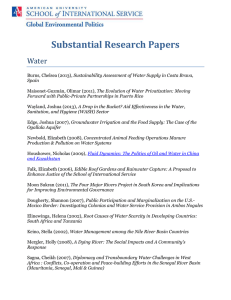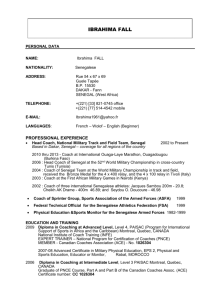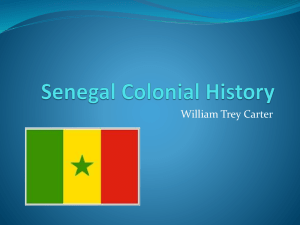A General Assembly Report of the Working Group on the Universal
advertisement
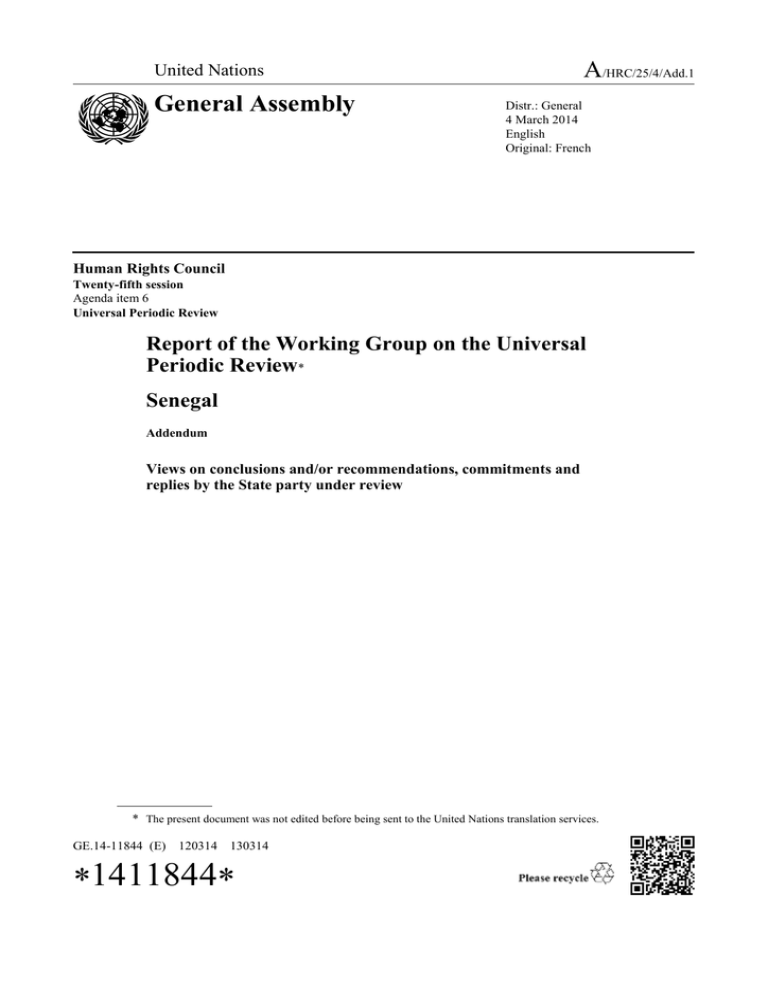
A/HRC/25/4/Add.1 United Nations General Assembly Distr.: General 4 March 2014 English Original: French Human Rights Council Twenty-fifth session Agenda item 6 Universal Periodic Review Report of the Working Group on the Universal Periodic Review* Senegal Addendum Views on conclusions and/or recommendations, commitments and replies by the State party under review * The present document was not edited before being sent to the United Nations translation services. GE.14-11844 (E) 120314 130314 A/HRC/25/4/Add.1 Replies to the 19 recommendations not considered on 21 October 2013 124.1 Ratify those international instruments on human rights to which Senegal is not yet a party (Niger) 1. Senegal has signed and ratified the principal international instruments on the protection and promotion of human rights. The Senegalese Government undertakes to continue the process of ratifying other international conventions. 124.2 Ratify the Second Optional Protocol to the International Covenant on Civil and Political Rights (Australia, Montenegro) 2. Senegal attaches particular attention to the issue of the death penalty, as amply illustrated by the fact that for several decades it refrained from applying the death penalty (the latest execution was carried out in 1967), until in 2004, when it was abolished by Act No. 2004-38 of 10 December 2004. 3. Having been a de facto abolitionist State long before becoming abolitionist de jure, Senegal has thus demonstrated its deep and unequivocal commitment to opposing the death penalty. The recommendation is therefore irrelevant and is rejected. 124.3 Accede to the Second Optional Protocol to the International Covenant on Civil and Political Rights aiming at the abolition of the death penalty (Benin) 4. Same reply as for paragraph 124.2. 124.4 Strengthen its commitment to the abolition of the death penalty by ratifying the Second Optional Protocol to the International Covenant on Civil and Political Rights (France) 5. Same reply as for paragraph 124.2. 124.5 Confirm at the international level its decision to abolish the death penalty, by ratifying the Second Optional Protocol to the International Covenant to the Civil and Political Rights aimed at abolishing the death penalty (Switzerland) 6. Same reply as for paragraph 124.2. 124.6 Undertake the ratification of the Second Optional Protocol to the International Covenant on Civil and Political Rights aiming at the abolition of the death penalty (Gabon) 7. 2 Same reply as for paragraph 124.2. GE.14-11844 A/HRC/25/4/Add.1 124.7 Consider ratifying the Second Optional Protocol to the International Covenant on Civil and Political Rights aiming at the abolition of death penalty (Rwanda) 8. Same reply as for paragraph 124.2. 124.8 Recognize the competence of the Committee on Enforced Disappearances (Uruguay) 9. Senegal signed the International Convention for the Protection of All Persons from Enforced Disappearance on 6 February 2007 and ratified it on 11 December 2008. 10. Pursuant to its international commitments, the Senegalese Government is unaware of any cases of enforced disappearance carried out at the initiative of the State or public authorities. This recommendation is rejected. 124.9 Ensure, in the context of the reform of the Penal Code and the Code of Criminal Procedure, the harmonization of Senegalese legislation with international law (Switzerland) 11. This recommendation is fully in line with Senegalese criminal policy. The draft Penal Code and Code of Criminal Procedure take sufficient account of the harmonization of our legislation with international human rights law. These draft Codes will soon be submitted to the Council of Ministers before being introduced in the National Assembly. 124.10 Extend a standing invitation to all special procedures of the Human Rights Council to promote and strengthen legislation and public policies on human rights (Uruguay) 12. Our country has always responded favourably to requests for visits by mandate holders under the special procedures of the former Commission on Human Rights and the Human Rights Council. For example, Senegal has recently received missions from the Committee against Torture, the Special Rapporteurs on the rights of migrants and the right to education and on trafficking in persons, particularly women and children, as well as from the Working Group on Arbitrary Detention. Concerning a standing invitation to all special procedures, Senegal reiterates its willingness to respond favourably to any requests to visit, particularly from special procedures mandate holders. This recommendation is rejected. 124.11 Extend a standing invitation to all Human Rights Council special procedures (Montenegro) 13. GE.14-11844 Same reply as for paragraph 124.10. 3 A/HRC/25/4/Add.1 124.12 Continue advancing in the gradual transformation of society regarding women’s rights by revising the Senegalese Family Code in order to put an end to situations of legal discrimination against Senegalese women, especially in terms of their ability to be the head of household (art. 152) (Spain) 14. Senegal’s commitment to the promotion of women is unequivocal and unwavering. In order to give women the full place that they deserve in our society, our country has been constantly promoting this objective. In the legislative elections of 6 July 2012, the 2010 law on gender equality in public elective office was put into effect for the first time. 15. The current system of parity, which flows from the struggle against discrimination, follows upon specific actions taken in respect of access to jobs and military service as well as payment of taxes. 16. In order gradually to eradicate the discriminatory provisions found in the Family Code, the Government has set up a committee on reform that brings together the various sectors affected by the phenomenon. 17. In this effort, our country has given priority to a participatory approach, bringing together all social groups in order to arrive at proposals for consensual reform. Accordingly, this recommendation is rejected. 124.13 Eliminate the caste system, which leads to stigmatization and ostracism of certain groups of Senegalese society (Romania) 18. In Senegal, best practices regarding the so-called “caste” system have not been institutionalized. Discrimination based on “caste” is neither authorized nor tolerated under the law. Indeed, the preamble to the Constitution proclaims “the rejection and elimination of all forms of injustice, inequality and discrimination”. Even better, this fundamental text, having laid down the principle of equality before the law and the sacred and inviolable nature of the human person, states, at the end of article 7, that “no one in Senegal shall have any liabilities or privileges based upon place of birth, status or family”. 19. In sum, then, the Senegalese Constitution permits no form of discrimination, including on the basis of caste. The Government, in conformity with its international obligations, cannot tolerate any discrimination based on “caste”, as demonstrated by the absence of legal disputes based on this form of discrimination. 20. While we must acknowledge that in Africa, as in other cultures of the world, caste issues may arise in myriad, oblique ways as part of social relations, frequently marriage relations, these relations are formed among private individuals, or groups of individuals, and accordingly are unknown to the State and its administrative branches. This recommendation is rejected. 124.14 Identify and prosecute those guilty of human rights violations in conflict situations (Mexico) 21. After the preamble to the Constitution, which recalls Senegal’s adherence to the conventions and declarations on human rights, Title II is devoted to the rights and freedoms of the human person. In the third sentence of article 7, the framers of the Constitution have stipulated that “The Senegalese people recognize the existence of sacred and inalienable human rights as the basis of any human community, of peace and of justice in the world”, 4 GE.14-11844 A/HRC/25/4/Add.1 and later, in article 91, that “The judicial branch is the guardian of the rights and freedoms set out in the Constitution and in the legislation.” 22. As the foregoing reveals, human rights violations are subject to prosecution in Senegal. Perpetrators of acts of torture and other cruel, inhuman or degrading treatment are systematically brought to justice. The political will of the State thus remains firm regarding breaches of human rights in conflict situations, just as in any other period. 23. As regards the pre-electoral violence of 2012, all allegations of torture have given rise to proceedings instituted by the competent legal authorities. 24. Legal action is systematically taken, even where disciplinary and professional penalties have been imposed, against the police, gendarmes, military personnel and other State agents implicated in allegations of torture. Accordingly, this recommendation is rejected. 124.15 Investigate all disappearances in the context of the conflict in Casamance, activating reparation mechanisms for the families of the persons disappeared where necessary (Spain) 25. Senegal is unaware of any cases of enforced disappearance caused by the State or public authorities in the context of the conflict in Casamance. Therefore, this recommendation is rejected. 124.16 Continue and finalize the procedure for the decriminalization of press offences (Democratic Republic of the Congo) 26. The decriminalization of press offences is a key provision of the draft Code on the Press in Senegal, which was drawn up in conjunction with the relevant stakeholders. The draft has been adopted by the Council of Ministers and was submitted to the National Assembly in September 2010, but the consideration of the text has been greatly delayed owing to a certain reticence on the part of parliamentarians regarding decriminalization of these offences. 27. In the interests of the adoption of the new Code decriminalizing press offences, the Government has engaged in consultations with the various parliamentary groups in order to give them a better understanding of the text, which in addition to decriminalizing press offences, also proposes solutions to numerous challenges arising in the press sector. These sectoral consultations are to be supplemented by a seminar for providing and sharing information, scheduled to take place in 2014, that will bring together the Government, deputies and the scientific committee that drew up the draft Code on the Press. 124.17 Decriminalize press offences (France) 28. Same reply as for paragraph 124.16. 124.18 Repeal section 80 of its Penal Code and, generally, ensure the independence and freedom of the press (Greece) 29. This recommendation on the repeal of article 80 of the Penal Code, dealing with threats to State security, was taken into account in the work of the commission on reform of the Penal Code and the Code of Criminal Procedure. This commission’s work has largely GE.14-11844 5 A/HRC/25/4/Add.1 been aimed at strengthening the exercise of individual freedoms. Freedom of expression has been proclaimed in and is guaranteed by the Constitution. 30. The legal regime for the exercise of freedom of expression envisages no advance authorization or controls in setting up a press agency, nor does it envisage control over the content of newspapers prior to publication. The exercise of freedom of expression is limited by restrictions based in law and derived from the need to protect private life and public order. 31. The majority of proceedings instituted against journalists concern offences under ordinary law such as the dissemination of false information, insults and offences against the Head of State. The prosecution of and verdicts on such offences are subject to the rules of ordinary law, not to the special procedure for press offences. 124.19 Support the amendment of relevant provisions of the Labour Code, curb unwarranted intervention by security forces and end antiunion discriminatory practices (United States of America) 32. The State does not engage in discrimination among trade unions: they are all treated equally. Trade union freedom is based on the Constitution, article 25 of which states that “The freedom to create unions or professional associations is a recognized right for all workers. The right to strike is recognized. It shall be exercised within the limits of the laws which are applicable thereto.” Act No. 97-17 of 1 December 1997 establishing the Labour Code refers to trade union freedom by stipulating, inter alia, that “Every worker or employer may freely join a trade union in the context of his or her professional activity”. Thanks to the freedom that they enjoy, trade unions may organize and operate freely, with no interference from the State. 33. In fact, the State has no discretion to determine representation in trade union confederations: this is determined by elections that are organized regularly, as was the case in 2011. 34. Trade union freedom is certainly guaranteed in Senegal; therefore, there is no cause to amend the relevant legislation. Trade union freedom and freedom of association are guaranteed in Senegal with no discrimination, barring the need to respect public order and safety. Consequently, this recommendation is rejected. 6 GE.14-11844
